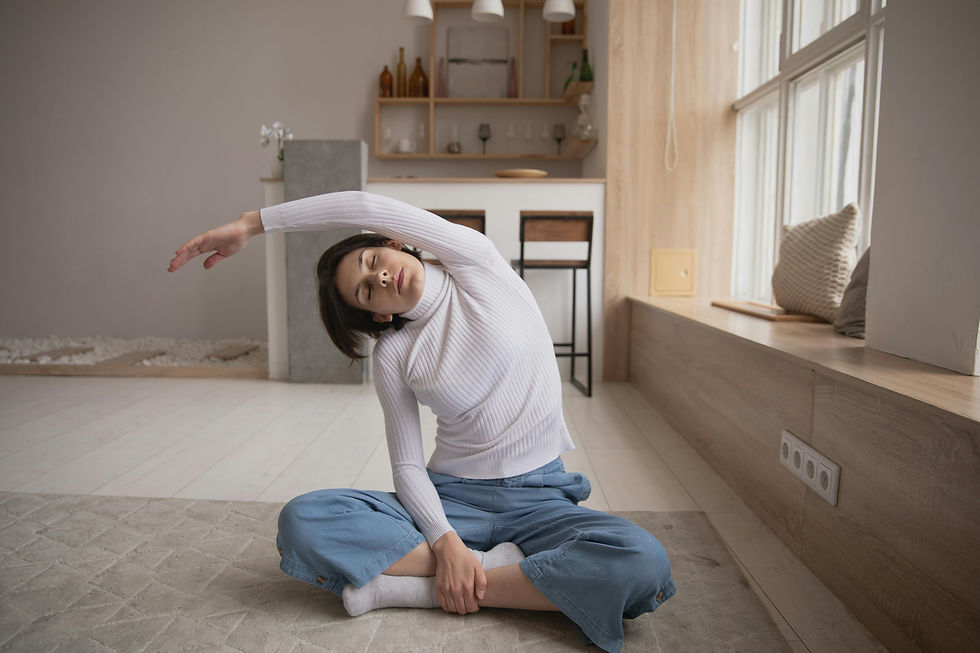9 Self-Care Ideas for Writers
- Emma
- Jul 24, 2024
- 4 min read
Updated: Jul 30, 2024

Mental health is at an all-time low, and I’m always looking for ways to keep myself healthy and happy. Self-care is the act of intentionally doing things to take care of your physical and mental health.
While most people could benefit from the following self-care ideas, these are things I do in relation to my career as a writer. They have been incredibly helpful for me, and I hope they help you, too.
Make sure you have an ergonomic writing set-up
Wrist, neck, and back pain are not uncommon for writers, myself included. Depending on my setup, I can tell a difference in my body as well as my productivity. While writing on the couch or in bed can be convenient and comfortable for a short time, it wreaks havoc on your body in the long-term.
The New York Times provided seven tips for creating an ergonomic desk set-up:
Eye level at the top of the screen or 1 to 2 inches below
Monitor roughly an arm’s length away
Chair with lumbar support, reclined at 100 to 110 degrees
Elbows bent at 90 degrees or more
Wrists flat at the keyboard
Knees level with hips or slightly below
Feet flat on the ground or footrest

Get up and stretch
Sitting for long periods of time just isn’t good for you. You know this—how often do you stand up after a long day of writing and struggle to take your first few steps? Feel back pain or wrist pain?
The Mayo Clinic recommends doing some simple stretches every 30-45 minutes to keep your body healthy. Even simple stretches and exercises like shoulder rolls can make a big difference. Learn more and find a quick stretching video here.
Look away from your computer monitor every now and then
I’ve been wearing glasses since I was eight years old and contact since fourteen. I’ve gotten to the point where eye strain is a serious issue for me, and I actually can’t wear my contacts for most of the day because they irritate my eyes too much. I’ve talked to my optometrist about this, and turns out, you’re not supposed to wear contact lenses for more than eight hours a day. Oops.
I’ve been wearing lenses for at least sixteen hours a day for the past fourteen years.
Now, I wear my glasses until lunchtime or later, and it has reduced my eye strain tremendously, but I still get headaches and feel my eyes struggling by the end of the work day. One tip that helps me is the 20-20-20 rule. Here’s how it works: Every 20 minutes, look at something at least 20 feet away for at least 20 seconds.
Keep your computer monitor on night mode
Another tip for reducing eye strain is to set your monitor or laptop’s display to night mode. Blue light is especially stressful for your eyes, and the warmer tones of night mode are easier on your eyes. Additionally, if you’re a late-night writer, switching from blue light may actually help you sleep. The blue light emitted by your computer screen emulates daylight and can actually keep you awake. Switching to night mode may make it easier for you to fall asleep.
Celebrate your writing successes
Every writer has different goals. Finish a novel outline. Draft the first draft. Write a query letter. Finish a (this) blog post.
When you finish a writing goal that you’ve been working toward, pick a way to celebrate. This could be something simple like rewarding yourself with a break or something bigger like going out for a nice dinner. You could even throw a soiree. My critique group throws a potluck dinner every time one of us gets published, and the author being celebrated shares a bit about their work, signs copies, and answers questions from the group.
Take a break from your work in progress
When you’re working on a big project, it’s easy to get burned out. I’ve been working on writing my novel, Shards of Clay, for about a year and a half now, and I need to take breaks every now and then to work on some other pieces to keep my creativity alive.
Blogging has been a good creative outlet for me, but I’m also working on another book and occasionally write short stories, such as “Bread of Heaven.” Following some writing prompts or writing outside of your usual format (e.g., poetry instead of prose) are also helpful.
Rest in a way that doesn’t involve reading or writing
All of my favorite activities involve reading or writing, but it’s hard to recover from a full day of reading and writing when I spend my rest time… reading and writing. It’s important to have hobbies that use different parts of your brain.
I also enjoy knitting, walking my dog, and cooking. I’m trying to get more into exercising and playing the piano. And while I still spend a lot of my free time reading or writing, balancing it with some of these other activities keeps me from feeling burned out.

Avoid drinking caffeine after lunchtime
Your morning cup of coffee stays in your bloodstream for ten hours.
Think about that for a minute. If you’re drinking caffeine into the afternoon, it’s in your system until the early hours of the morning and can affect your sleep. If you’re struggling in the afternoon, try boosting your energy by doing a quick stretch or going for a walk to the mailbox and back.
Stay hydrated
When you’re in the flow, it’s easy to forget to drink water. Sixty percent of your total body weight and 90% of your brain weight is water. It’s vital for your body to function properly.
Keep a cup on your desk or get yourself one of those colorful Stanley cups—whatever you need to do to drink enough water each day. Staying hydrated can also help boost your energy, so staying hydrated throughout the day could be a good replacement for your afternoon coffee.
These are just a few self-care tips for writers. Is there anything else you do to take good care of yourself? Share with me in the comments.








Comments